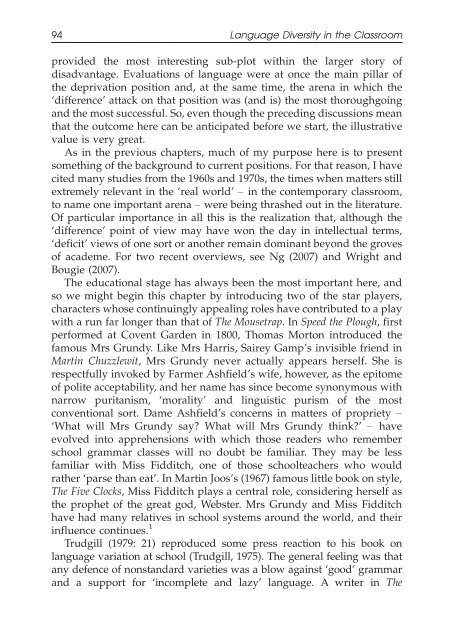Language Diversity in the Classroom - ymerleksi - home
Language Diversity in the Classroom - ymerleksi - home
Language Diversity in the Classroom - ymerleksi - home
- No tags were found...
You also want an ePaper? Increase the reach of your titles
YUMPU automatically turns print PDFs into web optimized ePapers that Google loves.
94 <strong>Language</strong> <strong>Diversity</strong> <strong>in</strong> <strong>the</strong> <strong>Classroom</strong>provided <strong>the</strong> most <strong>in</strong>terest<strong>in</strong>g sub-plot with<strong>in</strong> <strong>the</strong> larger story ofdisadvantage. Evaluations of language were at once <strong>the</strong> ma<strong>in</strong> pillar of<strong>the</strong> deprivation position and, at <strong>the</strong> same time, <strong>the</strong> arena <strong>in</strong> which <strong>the</strong>‘difference’ attack on that position was (and is) <strong>the</strong> most thoroughgo<strong>in</strong>gand <strong>the</strong> most successful. So, even though <strong>the</strong> preced<strong>in</strong>g discussions meanthat <strong>the</strong> outcome here can be anticipated before we start, <strong>the</strong> illustrativevalue is very great.As <strong>in</strong> <strong>the</strong> previous chapters, much of my purpose here is to presentsometh<strong>in</strong>g of <strong>the</strong> background to current positions. For that reason, I havecited many studies from <strong>the</strong> 1960s and 1970s, <strong>the</strong> times when matters stillextremely relevant <strong>in</strong> <strong>the</strong> ‘real world’ <strong>in</strong> <strong>the</strong> contemporary classroom,to name one important arena were be<strong>in</strong>g thrashed out <strong>in</strong> <strong>the</strong> literature.Of particular importance <strong>in</strong> all this is <strong>the</strong> realization that, although <strong>the</strong>‘difference’ po<strong>in</strong>t of view may have won <strong>the</strong> day <strong>in</strong> <strong>in</strong>tellectual terms,‘deficit’ views of one sort or ano<strong>the</strong>r rema<strong>in</strong> dom<strong>in</strong>ant beyond <strong>the</strong> grovesof academe. For two recent overviews, see Ng (2007) and Wright andBougie (2007).The educational stage has always been <strong>the</strong> most important here, andso we might beg<strong>in</strong> this chapter by <strong>in</strong>troduc<strong>in</strong>g two of <strong>the</strong> star players,characters whose cont<strong>in</strong>u<strong>in</strong>gly appeal<strong>in</strong>g roles have contributed to a playwith a run far longer than that of The Mousetrap. InSpeed <strong>the</strong> Plough, firstperformed at Covent Garden <strong>in</strong> 1800, Thomas Morton <strong>in</strong>troduced <strong>the</strong>famous Mrs Grundy. Like Mrs Harris, Sairey Gamp’s <strong>in</strong>visible friend <strong>in</strong>Mart<strong>in</strong> Chuzzlewit, Mrs Grundy never actually appears herself. She isrespectfully <strong>in</strong>voked by Farmer Ashfield’s wife, however, as <strong>the</strong> epitomeof polite acceptability, and her name has s<strong>in</strong>ce become synonymous withnarrow puritanism, ‘morality’ and l<strong>in</strong>guistic purism of <strong>the</strong> mostconventional sort. Dame Ashfield’s concerns <strong>in</strong> matters of propriety ‘What will Mrs Grundy say? What will Mrs Grundy th<strong>in</strong>k?’ haveevolved <strong>in</strong>to apprehensions with which those readers who rememberschool grammar classes will no doubt be familiar. They may be lessfamiliar with Miss Fidditch, one of those schoolteachers who wouldra<strong>the</strong>r ‘parse than eat’. In Mart<strong>in</strong> Joos’s (1967) famous little book on style,The Five Clocks, Miss Fidditch plays a central role, consider<strong>in</strong>g herself as<strong>the</strong> prophet of <strong>the</strong> great god, Webster. Mrs Grundy and Miss Fidditchhave had many relatives <strong>in</strong> school systems around <strong>the</strong> world, and <strong>the</strong>ir<strong>in</strong>fluence cont<strong>in</strong>ues. 1Trudgill (1979: 21) reproduced some press reaction to his book onlanguage variation at school (Trudgill, 1975). The general feel<strong>in</strong>g was thatany defence of nonstandard varieties was a blow aga<strong>in</strong>st ‘good’ grammarand a support for ‘<strong>in</strong>complete and lazy’ language. A writer <strong>in</strong> The
















